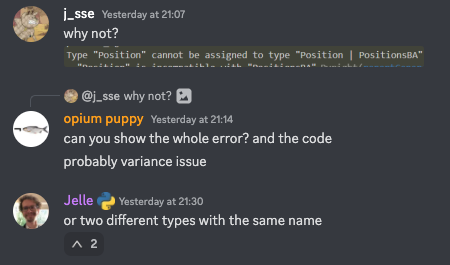Option to use qualified names in textDocument/hover #3822
Replies: 6 comments 2 replies
-
|
This isn't a core type checking issue, so I'll transfer it to the pylance-release project for discussion there. We've had requests before to expand type aliases for all types on hover (#2715), but I think this may be the first time we've had a request to use fully-qualified names. This seems like a pretty niche use case, so I don't know if the pylance team will be interested in exposing a new setting specifically for this. It's something we could leave open for discussion to see if there is additional interest from users. |
Beta Was this translation helpful? Give feedback.
-
|
I'm using pyright-langserver for this is this not a pyright feature request? |
Beta Was this translation helpful? Give feedback.
-
|
The pylance team is responsible for all language server features, even those that are implemented in the pyright code base. Pyright is focused on core type checking features. Any feature request that involves language server changes or settings (which are common to pylance or pyright) need to go through the pylance team. |
Beta Was this translation helpful? Give feedback.
-
|
Moving this issue to discussion as an enhancement request for comments and upvotes. |
Beta Was this translation helpful? Give feedback.
-
|
Just as a small demo as to why this is necessary in my case class Literal: ...
class Test:
x: int = 1Hovering over x reveals it to be Literal[1] which when evaluated in the file's namespace will resolve to something completely wrong and I have no way of detecting this. |
Beta Was this translation helpful? Give feedback.
-
Beta Was this translation helpful? Give feedback.

Uh oh!
There was an error while loading. Please reload this page.
-
Is your feature request related to a problem? Please describe.
I am currently writing a program to evaluate annotations for my documentation builds so variables that can't be evaluated by sphinx can be cross linked correctly using pyright's LSP and textDocument/hover. Currently evaluating types without a qualifier isn't particularly easy so I'd like to propose an option which prefixes symbols with their module
Describe the solution you'd like
An option to prefix symbols with their module which is disabled by default i.e.
(variable) y: Literal[1]->(variable) y: typing.Literal[1]Beta Was this translation helpful? Give feedback.
All reactions